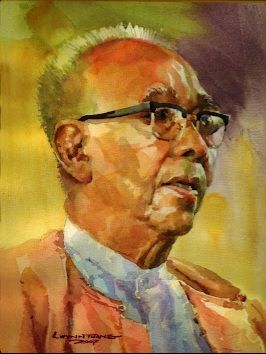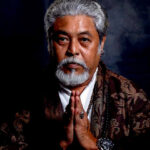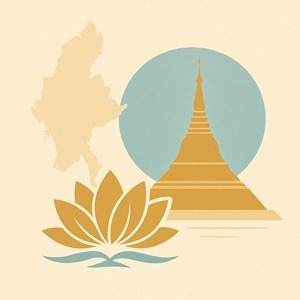
Min Thu Wun (1909–2004)
Early Life and Education
Min Thu Wun was born on February 10, 1909 in Natmauk, Magway Division, the same town as independence hero General Aung San. He studied at Rangoon University and later continued his education at Oxford University, where he developed his modern literary style influenced by both Burmese classics and Western literature. His return to Myanmar marked the beginning of a new era in Burmese writing.
Literary Career
Min Thu Wun was a pioneer of modern Burmese literature and a central figure in the Khit-San (Testing the Age) literary movement, alongside Zawgyi and Theippan Maung Wa.
He introduced simplified prose and poetry that were elegant, clear, and accessible to a wider audience.
His works often focused on nature, daily life, and human emotions, avoiding overly complex classical styles.
He was also a children’s writer, producing beloved poems and stories that are still read in schools today.
His most famous works include “Nway Nway” (Tender Tender) and numerous collections of poems that remain cornerstones of Burmese modern literature.
Contributions to Language and Culture
Beyond poetry and prose, Min Thu Wun contributed significantly to Burmese scholarship:
He worked on compiling and modernizing the Burmese dictionary, ensuring the preservation of language in the modern age.
He translated works of world literature into Burmese, opening global literature to local readers.
His writings emphasized national identity, cultural pride, and clarity of expression.
Political Life
Min Thu Wun was not only a writer but also a public figure:
In 1990, he was elected to the Pyithu Hluttaw (People’s Assembly) as a candidate for the National League for Democracy (NLD), led by Daw Aung San Suu Kyi.
The results of that election were annulled by the military junta, but his role symbolized the connection between intellectual life and democratic struggle in Myanmar.
Later Life and Death
Min Thu Wun lived through some of the most turbulent decades in Myanmar’s history, witnessing both colonial rule and military dictatorship. Despite censorship and political pressure, he remained a respected cultural leader and mentor to younger writers.
He passed away on August 15, 2004, at the age of 95. His death was widely mourned across the country, marking the end of an era in Burmese literature.
Legacy
Today, Min Thu Wun is remembered as:
A founding father of modern Burmese literature.
A beloved children’s author who gave joy to generations of readers.
A champion of language, culture, and democracy.
His contributions continue to influence both literature and education in Myanmar, ensuring his place as one of the most enduring voices in the nation’s cultural history.
📖 In summary: Min Thu Wun transformed Burmese literature with his clear and graceful style, nurtured national culture through scholarship and children’s writing, and stood as a quiet but powerful supporter of democracy.



